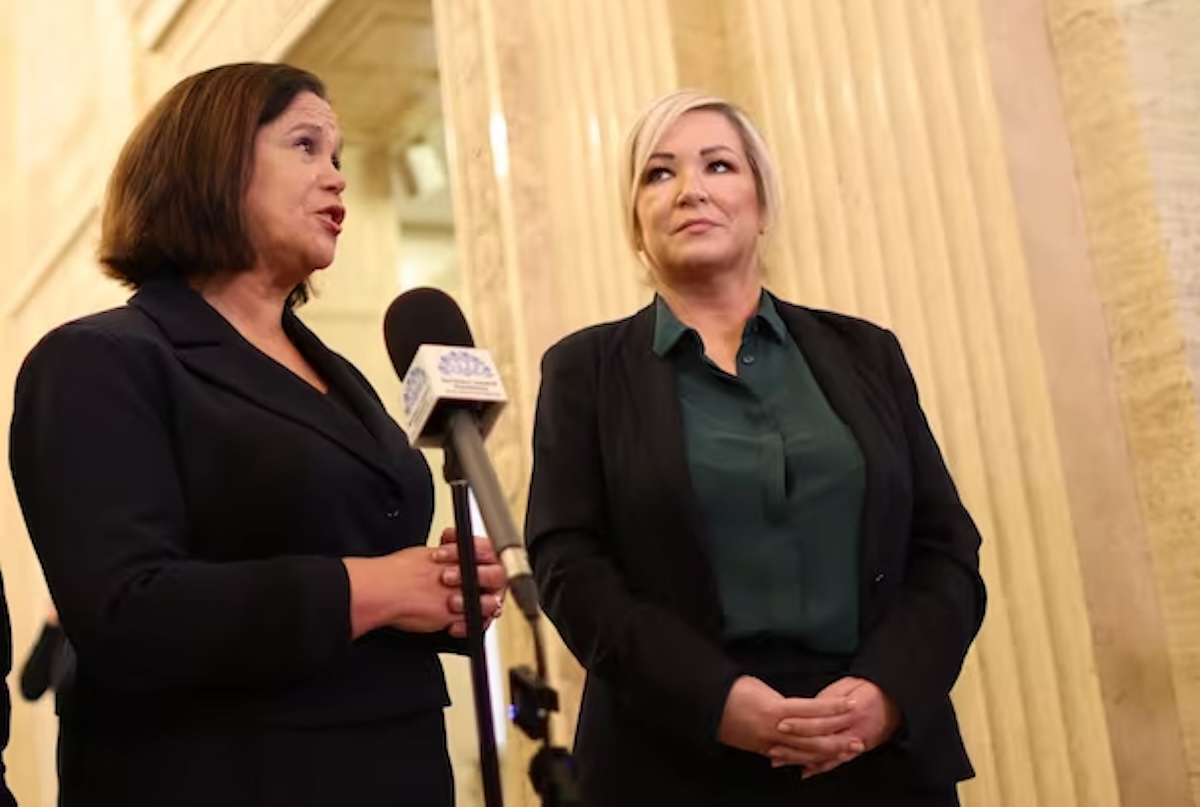
Sinn Féin has denied suggestions that it sought to provoke unionists with a claim by Mary Lou McDonald that a united Ireland is “within touching distance”.
The Sinn Féin leader spoke out after DUP leader Jeffrey Donaldson confirmed he is ready to drop his party’s boycott and revive the Stormont Assembly, where Ms McDonald’s colleague Michelle O’Neill is now set to finally take up her post as First Minister. She was elected to the post in May 2022.
Reacting to the DUP’s endorsement of a deal with the London government that will end its two-year boycott of the power-sharing Executive, Ms McDonald said the elevation of Ms O’Neill to the head of the North’s devolved government would be a moment of “very great significance”.
The recall of the Assembly could take place as early as Saturday.
Addressing the media at Stormont, Ms McDonald said the unionist political domination of the North of Ireland was at an end.
“I think a Sinn Féin First Minister, and Michelle coming into office as a First Minister for all, really is the most striking evidence that that era is now gone; it is now consigned to the pages of the history books,” she said.
“And more importantly it signals now the new Ireland emerging and the conversation around a new constitutional dispensation, ending partition, Irish unity, all of the opportunity that presents is in many ways embodied in this moment of Michelle O’Neill becoming First Minister here.”
Ms McDonald added “I think that the turn of events, the historical turning of the wheel, and the electoral place that we’re at, I think signifies that what we talk about now is possible.
“As a matter of fact, in historic terms, it’s within touching distance. And I think that’s a very exciting thing.”
The DUP collapsed Stormont in February 2022 when its former first minister Paul Givan quit the executive in protest at post-Brexit trading arrangements. Legislation that is being rushed through Westminster to ‘safeguard the Union’ has now finally provided to basis for the DUP to accept an executive.
“That will be a moment of very great significance, not simply because we haven’t had government for so long but because it will be the first time that we will have a Sinn Féin first minister, a nationalist first minister,” McDonald said.
“So, a mark of the extent of change that has occurred in the north and indeed right across Ireland.”
A message of historic change has also been delivered on social media, with Sinn Féin officials claiming that the first nationalist First Minister would be “seismic”.
“There’s entire generations who never thought an Irish republican could occupy high office in North. Change is coming and it’s on our side”, tweeted London-based official Joe Dwyer.
Another declared that the North has reached “the endgame”. Referring to Ms O’Neill’s married name, he said: “For the first time since the 17th century Flight of Earls we’ll have a Gaelic O’Neill chieftain in the north of Ireland.”
David Cullinane TD, a party frontbencher in the Dublin parliament, said it would be “symbolic of the massive changed politics in the North and across our island – and a glimpse of what is possible in the South”.
But there have also been warnings that loyalist paramilitaries could be ‘queasy’ over the installation of a Sinn Féin first minister.
The paramilitary murder gangs are said to be considering the details of the deal. Despite getting a special briefing by Jeffrey Donaldson, David Campbell of the ‘Loyalist Community Council’ suggested the election of Ms O’Neill would be “undemocratic”.
And former DUP leader Arlene Foster accused Sinn Féin of “dog whistle politics”.
“This poking of unionism in the eye will continue over the next while as Sinn Féin try to steady their activists,” she said.
She claimed the reality was that Ms O’Neill “is in a joint office with whoever the DUP put forward as deputy first minister and cannot act without joint agreement on decisions.”
But Ms O’Neill herself said there was a lot of optimism as a result of the deal.
“I think we have so much hope and opportunity in terms of the change, as we have been failed. Everyone across this island has been failed as a direct result of partition. Our people have been forced to live back-to-back instead of side-by-side.
“So let’s look at the opportunities we have ahead of us and that’s why we call on the Irish government to create the forum in which we can have a healthy conversation about change, about education, about health across the island.
“We are running two health services back-to-back, two education systems. We have so much opportunity that we need to harness and work together.
“I think the debate that we are going to have over the next decade is going to be one that hope and opportunity and benefits.
“But it has to be inclusive, it has to be about us all and about Irish identity, British identity and the people who have made here their homes, all coming together.”
![[Irish Republican News]](https://republican-news.org/graphics/title_gifs/rn.gif)
![[Irish Republican News]](https://republican-news.org/graphics/title_gifs/harp.gif)

